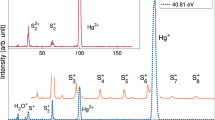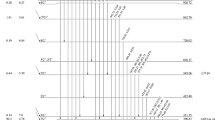Abstract
A search for tungsten radio-isotopes was made using a 5-mil tantalum foil which had received 80 micro-ampere-hours bombardment with approximately 20 MeV. deuterons from the 60-in. Crocker Laboratory cyclotron. The foil was dissolved in nitric acid containing five per cent of hydrofluoric acid. A few milligrams of tungsten carrier was added, and after removal of hydrofluoric acid by fuming with sulphuric acid, the tantalum was precipitated by sodium hydroxide and the precipitate digested with hot alkali. Tungsten was precipitated from the alkaline solution by boiling with excess nitric acid. The procedure was repeated until the tantalum-scavenging carrier precipitates were inactive.
This is a preview of subscription content, access via your institution
Access options
Subscribe to this journal
Receive 51 print issues and online access
$199.00 per year
only $3.90 per issue
Buy this article
- Purchase on Springer Link
- Instant access to full article PDF
Prices may be subject to local taxes which are calculated during checkout
Similar content being viewed by others
References
Compton, A. H., and Allison, S. K., "X-Rays inv Theory and Experiment", 2nd Ed. (New York: Van Nostrand).
De Benedetti, S., and McGowan, F. K., Phys. Rev., 70, 569 (1946).
Madansky, L., and Wiedenbeck, M. L., Phys. Rev., 72, 185 (1947).
Author information
Authors and Affiliations
Rights and permissions
About this article
Cite this article
WILKINSON, G. A New Isotope of Tungsten. Nature 160, 864–865 (1947). https://doi.org/10.1038/160864b0
Issue Date:
DOI: https://doi.org/10.1038/160864b0
This article is cited by
-
Radiations from178W
Il Nuovo Cimento (1956)
-
On the total decay energy in the orbital electron capture of181W
Il Nuovo Cimento (1955)
Comments
By submitting a comment you agree to abide by our Terms and Community Guidelines. If you find something abusive or that does not comply with our terms or guidelines please flag it as inappropriate.



